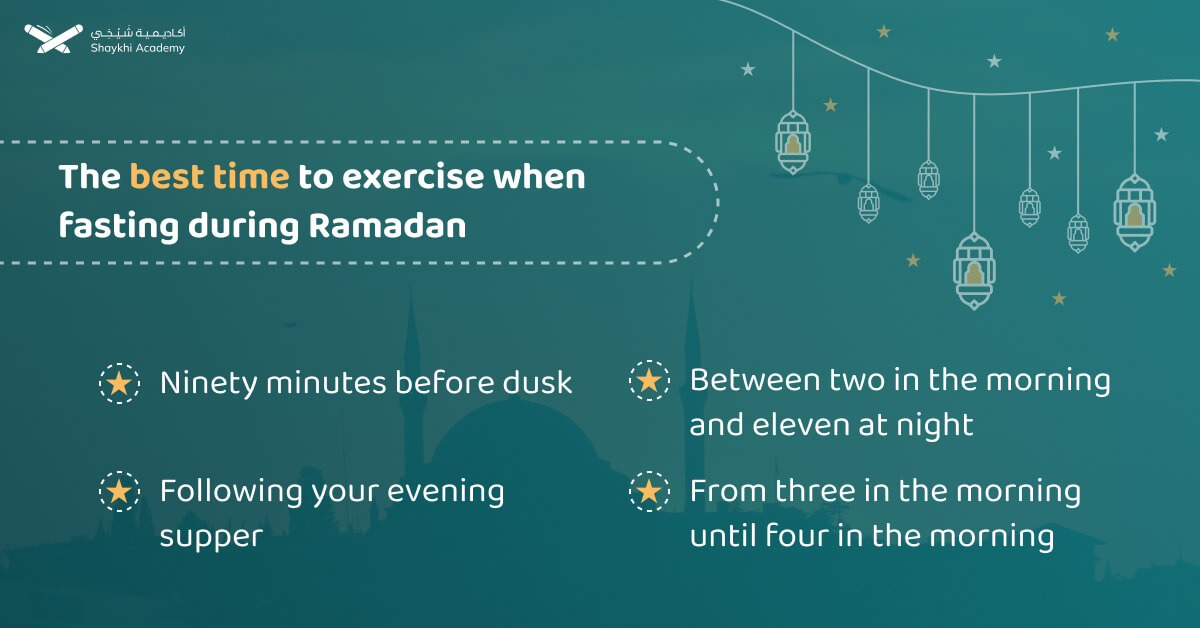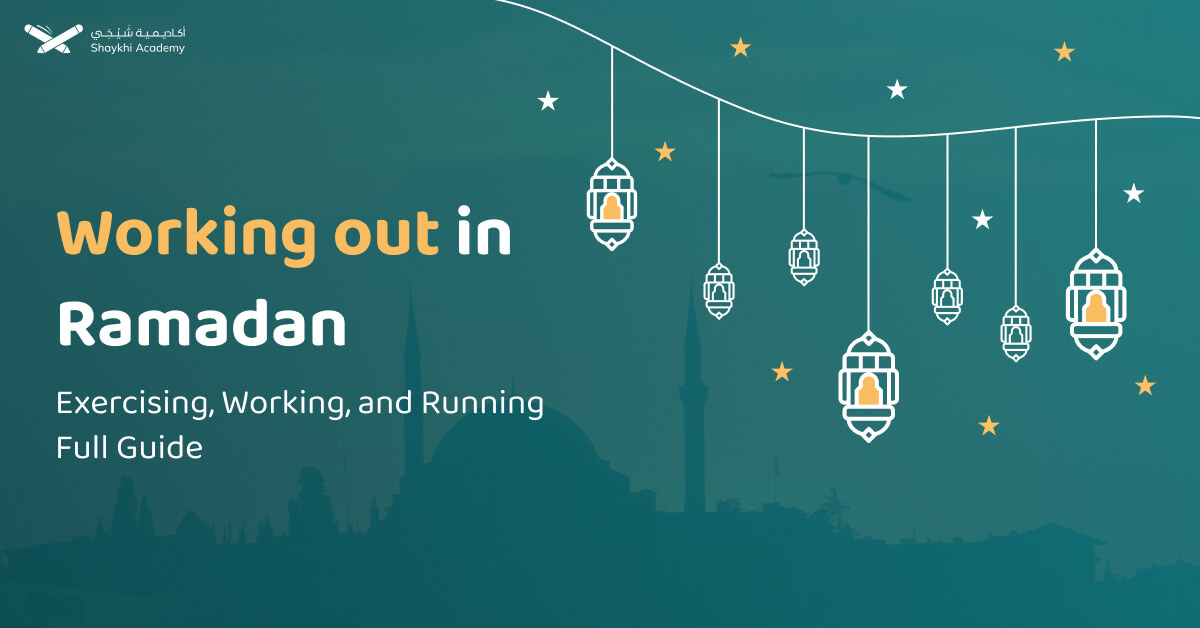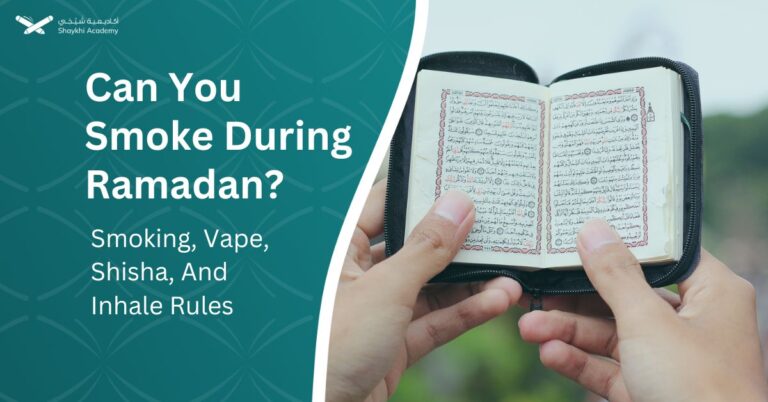Working out in Ramadan requires careful planning and consideration of timing, intensity, and hydration. It’s essential to prioritize safety and avoid vigorous activities that may lead to dehydration or overexertion. By following recommended guidelines, individuals can stay active while honoring their religious observance.
Finding the Time, energy, and Inspiration to Exercise in Ramadan might be even more of a challenge than overcoming ordinary obstacles. It can be particularly challenging to find the energy that helps us to exercise during Ramadan since among other rituals and observances, devout Muslims will fast during the day from sunrise to sunset for the whole 30 days of the month.
How therefore should one exercise throughout the month of Ramadan? When is the ideal time to exercise in Ramadan? Which kind of activity is ideal for fasting during Ramadan? We’ll talk about when to work out during Ramadan, how to work out during Ramadan, and some helpful advice in this post. Lets explore:
Is it okay Working out in Ramadan and exercise while fasting?
Yes, it is okay to workout and exercise while fasting in Ramadan. But Engaging in rigorous exercise while fasting during Ramadan can pose risks to your health, particularly due to dehydration and extreme temperatures.
It’s advisable to avoid intense workouts like heavy lifting and vigorous cardio during fasting hours. Instead, consider reducing your exercise routine to two cardio sessions per week to ensure your well-being and prevent overexertion during this sacred period. Rather than aiming to surpass fitness goals or set new records, focus on maintaining physical health, staying active, and ensuring adequate hydration and nutrition intake.
Is it safe to workout in Ramadan?
Engaging in workouts during Ramadan can be safe for many individuals, but it’s essential to listen to your body’s signals and adjust your routine accordingly. Given the changes in energy levels that may occur during fasting, it’s advisable to opt for low-impact activities such as strength training, walks, and stretching, rather than lengthy aerobic sessions or high-intensity workouts.
Prioritize maintaining your fitness level rather than striving for improvements, and consider scaling back on frequency, intensity, or duration if you’re feeling fatigued. Additionally, don’t hesitate to take more rest days and prioritize spending time with loved ones.
For further guidance on Islamic practices and how to make the most of Ramadan, Shaykhi Academy provides valuable resources to deepen your understanding and enhance your spiritual journey during this holy month.
Can I go to the gym during Ramadan?
Yes, without a doubt. Exercise in Ramadan depends on you and your physique. You may be relieved to learn that you don’t have to give up on your fitness quest even if it may seem like a long time to simply stop working out after a month.
So you can go to the gym whatever you want. But of course, it is necessary to commit to not mixing during the gym, that is, women go to the gym at completely different times from men and vice versa.
That is, women should go to the gym allocated to them without males and Males go to the gym allocated to them without women.
Can Muslims work during Ramadan?
Yes, Muslims can work during Ramadan, and many do so around the world while observing the fast. The duration of fasting days varies depending on regional dawn and sunset times, as Ramadan follows the lunar calendar. Despite fasting, Muslims continue with their daily responsibilities, including work, school, and other commitments.
While some businesses and educational institutions may adjust their hours during Ramadan, it is not mandatory for Muslims to skip work or other activities during fasting hours.
The fasting period is seen as an opportunity to cultivate self-control, self-discipline, and empathy through acts of charity and reflection. Muslims break their fast with an iftar meal at sunset, typically followed by evening prayers at the mosque. Despite the fasting, life continues as usual for many Muslims during Ramadan.

The best time to exercise when fasting during Ramadan
The best times to exercise during fasting in Ramadan are before dusk, after the evening meal, late at night, and right before morning suhoor. These times allow for light exercise, weight training, and stretching while ensuring proper hydration and energy levels:
1. Ninety minutes before dusk
If you work out lightly in the cooler hours of the day, you’ll be able to drink more water and enjoy the advantages of going out without eating. But any exercise at this time of day should be light, with lots of stretching, modest weights and repetitions, and more resistance training.
A quick, brisk walk or mild jog may be beneficial at this time as well.
2. Following your evening supper
Even though cardio might be challenging when you’re full from iftar, the hour following is an ideal time to do weight training. Add a little more food to your meals on the days you want to work out to feed your body, and make sure you drink lots of water to rehydrate.
3. Between two in the morning and eleven at night
If you prefer night, the ideal time to work out could be between 11 p.m. and 2 p.m., once your body has had time to thoroughly rehydrate and your food has had time to settle.
Exercise during this time of day might be beneficial if you can get some sleep in the afternoon. It is cooler than during the day and will provide you with a few more hours of sleep before you wake up to start the day.
4. From three in the morning until four in the morning
If you’re an early riser, your greatest workout time can be right before your morning suhoor. In this manner, you will be on an empty stomach yet still have energy from the meal the night before. You may refuel by eating again after your workout to replenish lost fluids. You’ll feel energized for the rest of the day with this strategy.
The best time to work in Ramadan for weight loss
It’s ideal to exercise in Ramadan just after your first meal of the day. If this isn’t feasible given your schedule, go to the gym straight after Iftar, your first substantial meal, to ensure your body is properly fueled and nourished for the best possible recovery and weight loss.
Running while fasting Ramadan Tips
Islamic adherents find the ninth month of the Islamic calendar to be especially difficult. In observance of Prophet Muhammad’s first revelation, it is a period when adherents are supposed to fast from food, water, and other consumables.
Exercise in Ramadan and Running is still very much doable, though, provided you prepare properly and pay attention to your body. Take a look at the following advice on what to do.
1. Do not aim to run more quickly:
It is ideal to think of this time as a chance to keep your endurance as your body is having a hard time during this phase. So, following the tying of your shoes, your main priorities should be your health and well-being rather than achieving a quick pace or a great distance.
According to experts, you should aim to do 70% of your regular workout in one hour or less.
Running large distances or at a high effort during the fasting period is not advised since this will overstress your body and lower your immune system, increasing your risk of injury.
Begin running for 30 to 60 minutes before you want to eat, and be very mindful of your body during this period. Relax right away if you observe any strange problems.
2. Determine what time is most convenient for you:
The best time to run is up to the individual, as with other things related to running. The exercise in Ramadan before Iftar or Suhoor has advantages and disadvantages.
Before Iftar, running:
Because it’s possible to run outside in the evening and because you may refuel and hydrate for eight to ten hours after your run, most runners opt to run before Iftar.
Running while fasting has additional benefits, such as enhancing the body’s ability to burn fat and stimulating mitochondrial biogenesis.
The apparent challenge is that your runs will be mild to moderately intense because you won’t have eaten or drunk anything for ten to twelve hours. If at all feasible, run in a group or with a companion throughout this period in case you encounter any difficulties.
At Suhoor:
There are also evident advantages, such as having more time for eating and getting a better night’s sleep. Additionally, you have the option of running farther or faster than you would have before Iftar.
Nevertheless, as daylight draws near, you have less time to repower and rehydrate. If you went for a run outside, you would also run in the dark and get less sleep.
3. Take into account indoor exercise:
Think about the advantages of jogging inside if the weather or safety issues for you during your runs. Using the treadmill at your neighborhood gym is a great substitute for running and exercise in Ramadan around the city.
In addition, cross-training using weights like dumbbells can be used to enhance activities like lunges, squats, and core work.
4. Refuel quickly when exercise in Ramadan:
After doing any type of activity, make sure to replenish your body with fluids and meals as soon as possible. According to the advice of the Prophet Muhammad, dates and water make the perfect mix for breaking fast and they’re also quite convenient to carry.
5. Recuperate well:
It’s also critical to make sure you receive as much high-quality sleep as you can. You have less time to sleep because you eat and pray at night. Establish healthy sleep habits by cutting off electronic gadgets and creating a stretching practice before bed.
A quick sleep during the day, if at all feasible, can aid in your body’s recuperation and recharging for any nighttime runs you may have scheduled.
6. Mentally get ready:
Muslims should concentrate on themselves, renew their commitment to God, and exercise self-control throughout Ramadan. All three of these features will be aided by exercise in Ramadan and running during this period.
During this holy month of training, many Muslim sportsmen claim that they not only learn about their own physical and mental limitations but also strengthen their relationship with Allah.
Additionally, runners can activate many psychological and physical resources that they might not otherwise choose to engage in. Being organized, disciplined, self-aware, and maintaining a good outlook are even more important during Ramadan than they normally are.
Pro advice: During the first seven days, go easy. It’s crucial to ease into any type of activity, including jogging, as your body will be adjusting to drastic changes in its food and sleeping patterns.
Unlock the Path to Quranic Mastery with Shaykhi Academy!
Are you seeking the finest Quranic education right from the comfort of your home? Look no further! Shaykhi Academy stands out as a premier online Quran learning platform, dedicated to providing exemplary education to both children and adults.
Why Choose Shaykhi Academy?
- Connect with highly qualified native tutors.
- Flexible scheduling to suit your busy lifestyle.
- Affordable classes tailored for all levels.
- Accessible from anywhere around the globe.
Discover Our Range of Courses:
- Arabic Noorani Qaida: Lay a solid foundation for Quranic studies.
- Online Quran Classes for Kids: Engaging lessons for lifelong learning.
- Tajweed Rules for Kids: Learn to recite with confidence.
- Quran Hifz for Kids: Step-by-step guidance to memorize the Quran.
- Quran for Adults: Introduce yourself to Quran reading and Tajweed rules.
- Online Arabic Courses: Master the language of the Quran.
- Islamic Studies: A wide range of topics related to Islam, including theology, law, Quranic studies, Hadith.
Don’t Miss Out on Your Chance to Excel!
Whether you’re a beginner or seeking advanced knowledge, Shaykhi Academy can guide you! Book your free trial now and make Ramadan 2024 your Quranic turning point!

Conclusion:
In conclusion, while it’s permissible to work out during fasting hours in Ramadan, it’s crucial to do so mindfully, considering one’s health and well-being. By adhering to recommended exercise times and focusing on maintaining fitness without overexerting oneself, individuals can effectively balance their spiritual and physical goals during this holy month. Remembering to listen to one’s body and seeking guidance from fitness experts can ensure a safe and beneficial exercise routine throughout Ramadan.

















































